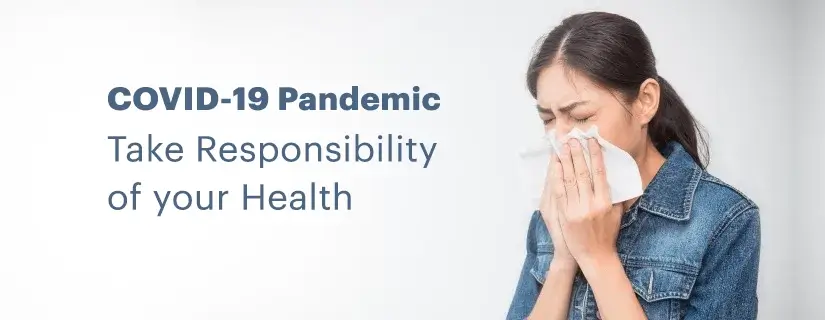-
Doctors
-
Specialities & Treatments
Centre of Excellence
Specialties
Treatments and Procedures
Hospitals & Directions HyderabadCARE Hospitals, Banjara Hills CARE Outpatient Centre, Banjara Hills CARE Hospitals, HITEC City CARE Hospitals, Nampally Gurunanak CARE Hospitals, Musheerabad CARE Hospitals Outpatient Centre, HITEC City CARE Hospitals, Malakpet
HyderabadCARE Hospitals, Banjara Hills CARE Outpatient Centre, Banjara Hills CARE Hospitals, HITEC City CARE Hospitals, Nampally Gurunanak CARE Hospitals, Musheerabad CARE Hospitals Outpatient Centre, HITEC City CARE Hospitals, Malakpet Raipur
Raipur
 Bhubaneswar
Bhubaneswar Visakhapatnam
Visakhapatnam
 Nagpur
Nagpur
 Indore
Indore
 Chh. Sambhajinagar
Chh. SambhajinagarClinics & Medical Centers
Book an AppointmentContact Us
Online Lab Reports
Book an Appointment
Consult Super-Specialist Doctors at CARE Hospitals
COVID-19 Second Wave
Updated on 13 April 2021

It's been more than a year since we first saw the outbreak of COVID-19. When the pandemic hit, governments all across the world implemented stringent measures for eradicating the virus. Many countries have been able to reach a plateau by bringing down the cases. However, there are some countries like India, Brazil, and the US that are struggling to control the outbreak and are having a high number of new COVID cases daily. With more than 40,000 new daily cases of coronavirus infections, India is currently witnessing the surge in Coronavirus infections in nearly four months after the spread had seemed to slow down. And while it’s early to discuss the “second wave”, health experts believe that we need to be prepared in order to make any difference in the outcome.
What is the “second wave”?
There isn’t any clear definition of “second wave” in relation to COVID-19. Different countries have been grappling with different forms of resurgences for quite some time now. According to ASHPER, a second wave can be defined as a resurgence of the incidence rate during a pandemic, which cumulatively presents an exponential increase in the number of cases of the disease in a given time period and specific territorial zone. This exponential increase follows from the disappearance or near disappearance of cases of the disease and may be influenced by a new behavioral characteristic of the infectious agent or a modified characteristic from another already known. In India, the first wave of COVID-19 began in March 2020 and continued till September 2020, since the number of cases had been falling. As of February 26, 2021, public health experts have cautioned that India may be on the verge of COVID-19 second wave. 86.18% of the new cases reported are from six states. This might be due to the easing of strict social distancing norms. People from both urban and rural areas aren’t adhering to Covid-19 appropriate behavior, which can be attributed to as the reason behind the second wave. What causes a second wave of COVID-19 cases? The biggest factor behind a spike in COVID-19 cases is human behavior. Some people follow COVID-19 precautions such as social distancing, washing hands regularly and wearing masks, whereas some people aren’t as prescriptive about following these measures. In major cities and towns, protocols are followed from time to time such as shutting down public places, limitations on the number of people gathering at a place at one time whereas, in smaller towns, these rules aren’t followed as strictly. Hence, cases spike in areas where protocols aren’t followed. Places such as long term care facilities, nursing homes, prisons, banquet halls, multigenerational households, schools and others also observe a “super spreader” event.
What to expect?
The exact extent of the second wave is still unknown. Just like the pandemic, whose current behaviors couldn’t be predicted until it was here, it is difficult to make any sweeping statement regarding what to expect from the second wave. However, there are a few possibilities. Even though experts have been reassuring that India won’t be experiencing a second wave, the increase in the number of coronavirus cases indicates otherwise. According to the Indian Council of Medical Research third national sero-survey, only 21.4% of the Indian population has developed COVID-19 antibodies. This means that a large section of people is still vulnerable. Globally, India is second on the list of the largest number of coronavirus cases, only after the United States. Experts believe that the only way to achieve “herd immunity” is through vaccination.
How to prepare for the “second wave”?
Just thinking about the pandemic’s second wave can be stressful. But, if you want to empower yourself, you have to focus on things that you can control. Thankfully, there are several things that you can do in order to prepare yourself and your family for the second wave. Check out this quick guide:
1. Change your perspective Even though you and everyone around you are exhausted from the coronavirus, it doesn’t mean that it is over. So, instead of wishing that things would go back to normal, you need to understand that the normal has changed. This will be the new normal for the future. Periods of social distancing will be the case in public. Restaurants will remain on and off and won’t be serving at full capacity, working from home might extend for a longer duration, and malls will enforce six-foot distancing.
2. Get vaccinated If you are over 60 years of age or over 45 with comorbidities, you are eligible for the COVID-19 vaccination at different government and private centers in India. You can register yourself at the Co-WIN platform using your mobile number. The platform is GPS-enabled so that you have the option of selecting the vaccination site at government and private facilities. You can even get inoculated in a state different from your home. The COVID-19 vaccine will be given free of cost at government hospitals. However, the private facilities are charging Rs 250 per dose for the vaccine.
3. Continue taking precautionary measures By now, you must have mastered the basic precautionary measures taken to prevent the spread of the virus such as wearing a face mask, not touching your face, washing your hands properly, following social distancing guidelines, and, if you have COVID-19 symptoms, self-isolating. While you are preparing yourself to embrace the second wave, make sure that you stay informed by visiting the right sources. You can check the MoHFW website for coronavirus details in India.
4. Stay updated Keep yourself informed if cases begin to increase in your locality. Stay in touch with local health authorities to avoid falling prey to fake news.
What are the experts doing?
Infectious disease experts and public health officials are working hard to ensure that people continue to follow the social distancing practices, even after they have been vaccinated. Several organizations around the world have already sounded the alarm on the widespread and severe shortage of ventilators, personal protective equipment (PPE), medical supplies, ventilators, hospital staff, testing kits, and medications. Hospital staff is in desperate need of these to continue fighting against the coronavirus and preparing for the second wave. Infectious disease experts are working on expanding their testing methods for people with COVID-19 symptoms as well as doing further research on the antibodies or proteins made by the body as a response to the virus. By doing this study, it can provide us with an idea of how small or big the second wave can be.
Conclusion
It is important to take COVID treatments and note that the steps you are taking are not just to protect yourself, but to also protect your friends, family, and community safety. Stay updated with the latest developments in testing and vaccination.

ENQUIRY FORM
SELECT CATEGORIES
-
Neurosciences (16)
-
Neurology (37)
-
Neurosurgery (14)
-
Orthopaedics (48)
-
Oncology (33)
-
Obstetrics and gynecology (52)
-
Pulmonology (23)
-
Urology (20)
-
Nephrology (13)
-
Psychiatry (7)
-
Dietetics and Nutrition (111)
-
General Medicine (63)
-
Cardiac Sciences (32)
-
Vascular & Endovascular Surgery and Interventional Radiology (15)
-
Gastroenterology (46)
-
Endocrinology (23)
-
Plastic Surgery (10)
-
Critical Care Medicine (5)
-
COVID-19 (16)
-
Dermatology (16)
-
Emergency Care (1)
-
Ophthalmology (4)
-
Pediatrics (14)
-
Laparoscopic and Bariatric Surgery (8)
-
ENT (15)
-
Kidney Transplant (1)
-
Liver Transplantation and Hepatobiliary Surgery (5)
-
General Surgery (3)
-
Internal Medicine (5)
-
Medicine Information
Ways To Protect Your Mental Health During Covid-19 Pandemic
Loss of smell
YOU MAY ALSO LIKE
RECENT BLOGS
-

Preterm Birth (Premature Birth): Symptoms, Causes, Treatment and Prevention
13 May 2025
Read More
-

Rotablation Angioplasty: Benefits, Treatments, And Recovery Time
9 May 2025
Read More
-

What Is The Difference Between IUI and IVF?
9 May 2025
Read More
-

Venous Malformations: Causes, Symptoms, and Treatment
30 April 2025
Read More
-

Varicose Vein Foam Sclerotherapy: Treatment, Benefits, and Procedure
30 April 2025
Read More
-

Radiofrequency (RF) Ablation Treatment for Varicose Veins: Know More
30 April 2025
Read More
-

Varicose Vein Sclerotherapy: Treatment, Benefits, and Procedure
30 April 2025
Read More
-

Varicose Vein Endovenous Laser Ablation: Procedure, Benefits, Risks
30 April 2025
Read More
Have a Question?
If you cannot find answers to your queries, please fill out the enquiry form or call the number below. We will contact you shortly.














